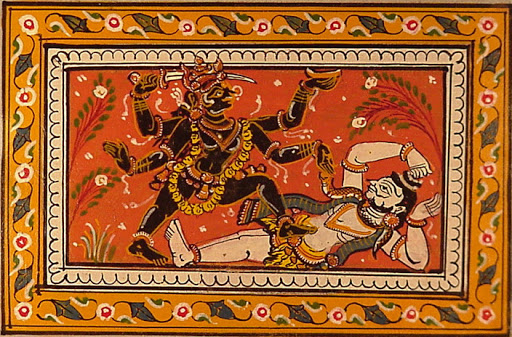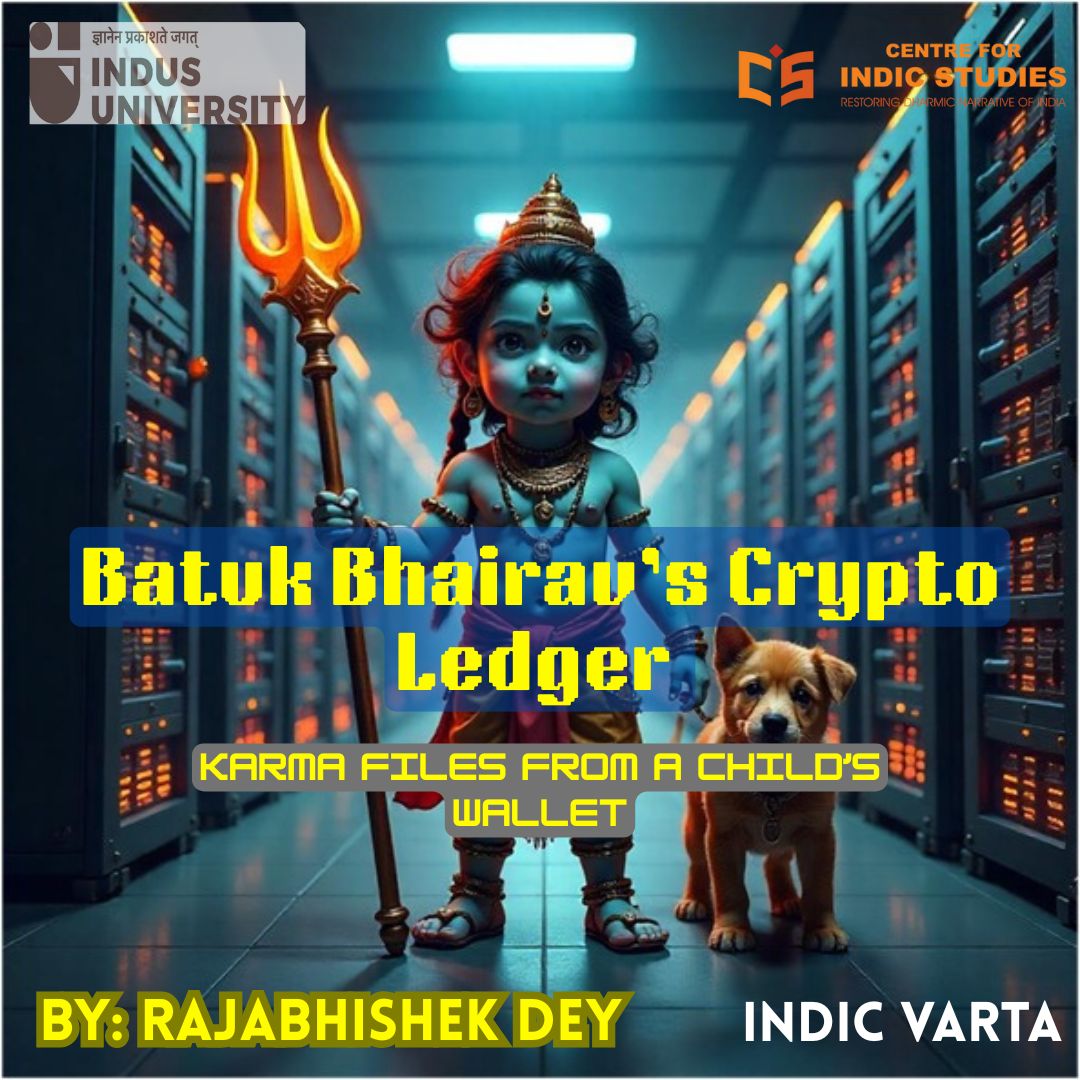- Visitor:82
- Published on:
Why the West does not Understand Kali
With the recent Armin Navabi controversy where he insulted Goddess Kali by depicting her in a ‘sexy’ avatar, Nithin Sridhar tells us what the real meaning of symbolism behind Kali depiction is.

“In the distant past, the land that would be India played host to a war between ancient aliens, whose cross-temporal battles contributed to the country’s rich myths and legends. Kali, oldest and deadliest of these creatures, was thought defeated long, long ago; her body scattered throughout time to prevent her return. But her psychic essence could not be killed… nor her millennia-long quest for vengeance.
“Now, in the 23rd Century, she is on the brink of resurrection. And with India at the forefront of human spaceflight, it’s not only Earth that falls to her predations if she succeeds – but the whole cosmos!
“In a race against time, and across it, the Doctor and Clara must gather secrets, intelligence, and allies from across India’s past, present, and future – if they are to survive… THE SWORDS OF KALI.”
This is the summary of the second story in the Doctor Who: The Twelfth Doctor comic strip published by the Titan Comics. The story portrays Goddess Kali, one of the most revered mothers in Hinduism as an alien creature who is seeking revenge. The comic appears to have even appropriated the story of Sati and how her body parts were scattered after she burned herself in her father’s Yajna (fire ritual) and distorted it to fit into their story of alien battles.
There is nothing wrong per se with portrayal of Kali or other Hindu Gods and symbols in comics or movies. But, such a portrayal should be true to their meaning and depiction in the source culture. A distorted portrayal not only depicts ignorance and negligence on the part of those who use other culture’s symbols, but when this distortion keeps happening again and again, it points towards deliberate malaise and pre-conceived biases towards certain cultures that are outside the mainstream western culture.
But there are problematic depictions of Kali. For example, recently, Armin Navabi a self-proclaimed ex-Muslim insulted goddess Kali by a provocatively drawn image of Kali and calling her ‘hot’. This created a twitter and media storm in which many Hindus responded in kind. Navabi thinks that this is the birthright of any human being to insult anyone and Hindus should have no problem with it. Before we go into the reasons of why this claim is wrong, let us look at other insulting and distorting depictions of Kali.
Depiction of Goddess Kali in American entertainment industry
The Titan comics are neither the first nor the only people to portray Mother Kali in a negative as well as incorrect manner. Here are the few examples:In 1984 “Indiana Jones and the Temple of Doom” movie, Goddess Kali was portrayed as a monster, to whom human sacrifices were given by Thugees. The whole scene is depicted dramatically in such a way that it gives the impression as if Goddess Kali is some kind of evil.
In 2008, Supermodel Heidi Klum dressed as Goddess Kali for a Halloween party. When asked about why she chose to dress like Kali, she said the idea was given to her by her secretary, and she added:” I loved it because she’s so mean and killed all these different people and had fingers hanging off her and little shrunken heads everywhere.” Her statement clearly shows that she considers Kali as a mean people killer, which clearly depicts her lack of understanding of the iconography of Kali.
In 2010, in a famous TV series called “Supernatural”, both Mother Kali and her son Lord Ganesha have been depicted in a very poor light. First, it portrays Goddess Kali as having an affair with Angel Gabriel and Baldur. Then, it portrays Ganesha as a big fat man who is reduced to a splash of blood by Lucifer, the evil personified in Christian theology. The whole episode makes a mockery of Hindu religion and Hindu deities on multiple counts. It propagates the medieval Christian view that depicts Pagan gods as inferior and powerless compared to even the Christian angels and equates Hindu Gods and Hindu symbols with other pagan systems. The episode not only shows the extent of ignorance present in western society about Hinduism, but also shows the pre-conceived bias they have cultivated.
The 2012 online video action game SMITE allowed players to play as various gods and other characters. The game includes characters from Hindu, Greek, Chinese, Egyptian, and Norse civilizations. The fact that various Gods from Hinduism like Kali, Agni, Rama etc. has been included alongside Gods from Pagan cultures which no longer flourishes, again shows a medieval Christian mentality of rejecting everything non-Christian as pagan and hence inferior and false. This view is further highlighted by the absence of any angels or characters from Christian or other Abrahamic mythologies.
In 2014, Goddess Kali was included in a sexual joke shown in TBS late nights where it showed Kali as one among various historical women, with which one can have sex using Time Bone machine.
In 2015, Fox’s show “Sleepy Hollow” showed Vetala (a spirit) who has no significant connection with Goddess Kali as being a demon servant of her. It further showed a statue of Kali being used to turn a man into a demon, something which is alien to the understanding of Kali or Vetala or the concept of demon in Hinduism.
These few examples are enough to show the ignorance and the disdain that is shared by many people in the west, especially those who are involved in making movies, TV shows, comic strips etc. and other aspects of the entertainment industry. But, these negative portrayals are not limited to entertainment industry alone. It is present in western academics as well.
Depiction of Kali in Western Academics
Sarah Caldwell, in her article “The Bloodthirsty tongue and the self-fed breast, homosexual fellatio fantasy in a south Indian ritual tradition” which won her the Robert Stoller award, writes:
“This essay demonstrates that in Kerala, symbolism of the fierce goddess [Kali] does not represent abreactions of the primal scene fantasies of a Kleinian phallic mother or introjection of the fathers penis; rather, we will show that themes of eroticism and aggression in the mythology are male transsexual fantasies reflecting intense preoedipal fixation on the mothers body and expressing conflicts over primary feminine identity.”
She further quotes D. M. Wulffs view on the imagery of Goddess Kali: “[Kali] is herself, first of all, a phallic being, the mother with a penis, she stands triumphantly erect on Sivas body, sword raised, fingers pointed, and eyes and tongue protruding. At the same time, draped with severed heads and hands, she is the bloodied image of the castrating and menstruating (thus castrating) female.”
According to them, Mother Kali symbolizes “male transsexual fantasies” and is a “mother with a penis” who depicts a “castrating female.” These depictions are completely alien to Hindu perception of Goddess Kali. The academics seem to have an intention to portray the worship of Kali as a worship of “mother with a penis” just like they often portray the worship of Lord Shiva as a worship of “human phallus” without properly understanding the meaning of “Linga” which has multiple meanings like mark, pillar, phallus etc.
Prof. Dr. Narasingha Sil in his 1996 lecture which has been published here- “The Status of Kali in American Academia” says: “Then, with the advent of the electronic age since the late eighties and the early nineties, the Bengali Kali was sacrificed at the altar of the free-thinking, free-wheeling but utterly benighted computer buffs and has been transformed into a pretty and lusty beast of the East that you are now looking at—a booted but naked woman with markedly Mediterranean features perched on a toilet seat, possessing six hands (any being other than the bimanual human is enough to be regarded as a Hindu deity) holding all the artifices of autoerotism, and actually masturbating with an oversize dildo.
Or we have Kali who resembles a monstrous mutant sci-fi creature with a lolling tongue or, partially true to some indigenous iconography, an excessively passionate female in rut or animal heat on top of the ethyphallus Mahadeva, the Great God (another appellation of Siva) in a posture of viparitarati [reverse sex].”
Dr. Sil further quotes a few poems on Kali taken from the internet. One poem runs like this:
“Kali is a slut, and a bitch.
She fucked your grandmother and your grandfather at the same time.
Kali is willing to sexually/spiritually ravish
all would-be lovers: man, woman and child.”
Another similar poem reads thus:
“Kali, my Bitch-Slut-Whore,
fuckest Thou my Dad and Gran,
great Kinky Tart, would Thou
do as much for I, Thy son.”
Therefore, the current conception of Goddess Kali among many people in the west is not only that of a blood-lusting monster or a mother with a penis but also as one who masturbates with an oversized dildo and is a complete slut who sleeps with everybody.
These highly sexual and perverse interpretations of Goddess Kali is completely alien to Hindu philosophy and iconography.
Mother Kali in Hindu tradition
The name Kali which is actually pronounced as “kAli”, is taken from the root word “kaala” which can either mean time or darkness. Time denotes motion as time is always in motion. The time has no beginning. It is always changing. In fact, the whole universe and all its objects are always in the motion driven by time. The objects, take birth, grow in size, decay and finally die. This whole process is driven by time. And Kali is one who is the essence of “time”, who is “time” herself.
Therefore, it is Kali who creates, controls, and destroys the Universe. She is called as “Adya-the oldest or the first” who is the source of all changes, all manifestations. The other meaning of the term “Darkness” or “Black” also denotes the same meaning.
Just as Black color denotes an absorption of all colors in science, Kali represents a state wherein the whole universe lies absorbed in an Unmanifested seed state (also called as Mula-prakriti). Therefore, as the embodiment of time, she is the creator and sustainer of the universe, and as an embodiment of darkness, she denotes the dissolution of the Universe.
She can be considered as equivalent to Samkhyan Prakriti and Vedantic Maya. Therefore, her name or her color which is “Black” does not denote that she is a “monster”.
Now coming to her iconographic details, she is shown as having her tongue lolling out with blood dripping from her mouth. She is usually depicted as having four hands, with one holding a sword, another a severed head, the other two hands are in the mudras of granting blessings and grant fearlessness, or sometimes hold objects like lotus or a bowl. She is naked with disheveled hairs and is usually shown in the backdrop of a Samshaan (cremation ground). She wears a garland of skulls around her neck and a skirt made of severed hands.
Now, let us look at what these means. A garment is a covering draped on the body. The whole cosmos can be understood as a cosmic body of Kali. There is nothing outside it. Therefore, she is without a garment, without a covering. Hence, she is naked. Garment can also represent the limitation of “rupa/form”. The manifestation of various objects is nothing but a manifestation of nama (name) and rupa (form). But, Kali being the unmanifested source has no “rupa” and hence is naked. The garment may also denote the three gunas i.e. Sattva, Rajas, and Tamas, that is worn by Atman (Self) to become manifest as universe. Kali who is non-different from Atman in its absolute state, is without the gunas and hence naked. Therefore, there is no sexuality involved in her depiction as being naked.
The blood dripping from her mouth and her apparent blood-lust depicts a very specific spiritual process of “Rakta-Shuddi”, the purification of the blood. Blood is the most important carrier of the Prana (vital force) in the physical body. The purification of the Prana and hence of the blood is very important in Kundalini yoga. Goddess Kali is the one who purifies the Prana. Her drinking of blood denotes this purification of blood and vital force. This drinking of blood can also mean the absorption of the individual vital forces into herself. That is, she liberates a person from bondage to physical body and helps him to merge his subtle body into hers, thereby attaining spiritual union with her.
The severed head indicates the ego of the individuals that is afflicted with lust, anger, delusion and other passions of the mind. The sword is used to cut this unpurified ego. Goddess Kali is the one who grants purification of the mind by cutting of the limited ego that is afflicted with mental passions called “arishdvarga”. The hands showing boon and a sign of fearlessness needs no further explanation.
The severed hands represent Karmas or actions. “Hands” are one of the organs of actions and hence is used as a symbol for “Karmas”. She wears a skirt of severed hands, because it is she alone who is able to severe our karmas, and make us free of their bondage. She helps the spiritual practitioners to move towards Moksha (liberation), by cutting their Karmas one by one.
The garland of severed heads is sometimes depicted as being 51 in numbers that depict the 51 letters of Sanskrit and hence the whole domain of speech and knowledge. The garland of skulls may also denote that a person has to undergo hundreds of lives in various bodies before he could attain Moksha. The disheveled hair denote that she is not bound by the rules of human society.
She is usually depicted as having one of her legs on the chest of Lord Shiva who lies on the ground in a static state. This represents the Purusha-Prakriti aspect of Samkhya. Shiva is static absolute Brahman, Kali is the power of this Brahman to have motion. Therefore, Shiva is lying without movement and Kali is standing or dancing on him.
In some depictions, especially with respect to forms like Chinnamasta, the Shakti is shown as being in a sexual union with Shiva who is lying static on the ground. The imagery is a direct depiction of the cosmic union of Purusha and Prakriti. The fact that Brahman and his power are non-different is being depicted in this imagery. The sexual union being the physical imitation of the cosmic union, the imagery aims to highlight the comic and spiritual union through sexual union. Further, in certain tantrika sadhanas (tantrika practices), the sexual energy is used to attain a spiritual union.
But, these nuances are either missed or deliberately ignored in the western commentary on Hinduism. Their understanding and interpretation of Goddess Kali is completely alien to Hindu world-view. In fact, the depictions of Kali as monstrous mother with a penis or as a whore can be easily branded as blasphemous if such a concept of blasphemy had been present in Hinduism.
This freedom of expression without concepts like blasphemy is being misused by certain quarters of western academia, media, and entertainment industry including Armin Navabi. The tantrika philosophy and spirituality is dismissed as superstition and in their place, perverse, incorrect, and non-existent meanings are being attached to Goddess Kali and other Hindu deities and symbols.
But, all is not lost.
Every cloud has a silver lining
There are many authors and teachers in the west who have understood Hinduism and Hindu traditions in depth. Their writings and teachings are in conformity with the Hindu philosophy. For example, books by authors like David Frawley and Dr. Robert Svoboda are very thorough and shed new light on ancient teachings.
In 2015 a huge image of Mother Kali was projected on the face of the Empire State Building. It was part of a display by filmmaker Louie Psihoyos and his team Projecting Change to create awareness about wildlife extinction. The display included projection of a large number of endangered animals and at the end of it the image of Mother Kali was depicted.
Regarding the event, this article says: “This Kali apparition over Manhattan may be our last warning. Fierce protectress of truth, she tells it like it is, she beckons us to dive into the dark, to face the stark reality of the global ecological crisis upon us, and to let heartbreak be the ground from which we awaken and serve.”
It further adds: “It is time to get our Kali on inside and out; to cut off the head and commit to the heart on all levels. So many of us are shedding our false selves, empty certainties and small lives, and no matter how much we wish for the safety of the old, the more desperately we hold on, the hotter the fires of the Real.”.
[First published at Newsgram.]
- 41 min read
- 3
- 0










